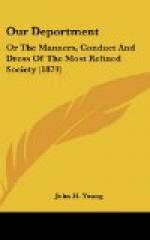The Prince of Wales, the heir-apparent to the throne, stands second in dignity. The other children are all known during their minority as princes and princesses. The eldest princess is called the crown princess. Upon their majority the younger sons have the title of duke bestowed upon them, and the daughters retain that of princesses, adding to it the title of their husbands. They are all designated as “Their Royal Highnesses.”
THE NOBILITY.
A duke who inherits the title from his father, stands one grade below a royal duke. The wife of a duke is known as a duchess. They are both addressed as “Your Grace.” The eldest son is a marquis until he inherits the higher title of his father. His wife is a marchioness. The younger sons are lords by courtesy, and the daughters are distinguished by having “Lady” prefixed to their Christian names. Earls and barons are both spoken of as lords and their wives as ladies, though the latter are by right respectively countesses and baronesses. The daughters of the former are “ladies,” the younger sons of both “honorables.” The earl occupies the higher position of the two in the peerage.
These complete the list of nobility, unless we include bishops, who are lords in right of their ecclesiastical office, but whose title is not hereditary.
All these are entitled to seats in the upper House of Parliament.
THE GENTRY.
Baronets are known as “Sirs,” and their wives receive the title of “Lady;” but they are only commoners of a higher degree, though there are families who have borne their title for many successive generations who would not exchange it for a recently created peerage.
A clergyman, by right of his calling, stands on an equality with all commoners, a bishop with all peers.
ESQUIRE.
The title of Esquire, which is only an empty compliment in this country, has special significance in England. The following in that country have a legal right to the title:
The sons of peers, whether known in common conversation as lords or honorables.
The eldest sons of peers’ sons, and their eldest sons in perpetual succession.
All the sons of baronets.
All esquires of the Knights of the Bath.
Lords of manors, chiefs of clans and other tenants of the crown in capite are esquires by prescription.
Esquires created to that rank by patent, and their eldest sons in perpetual succession.
Esquires by office, such as justices of the peace while on the roll, mayors of towns during mayoralty, and sheriffs of counties (who retain the title for life).
Members of the House of Commons.
Barristers-at-law.
Bachelors of divinity, law and physic.
All who in commissions signed by the sovereign, are ever styled esquires retain that designation for life.




